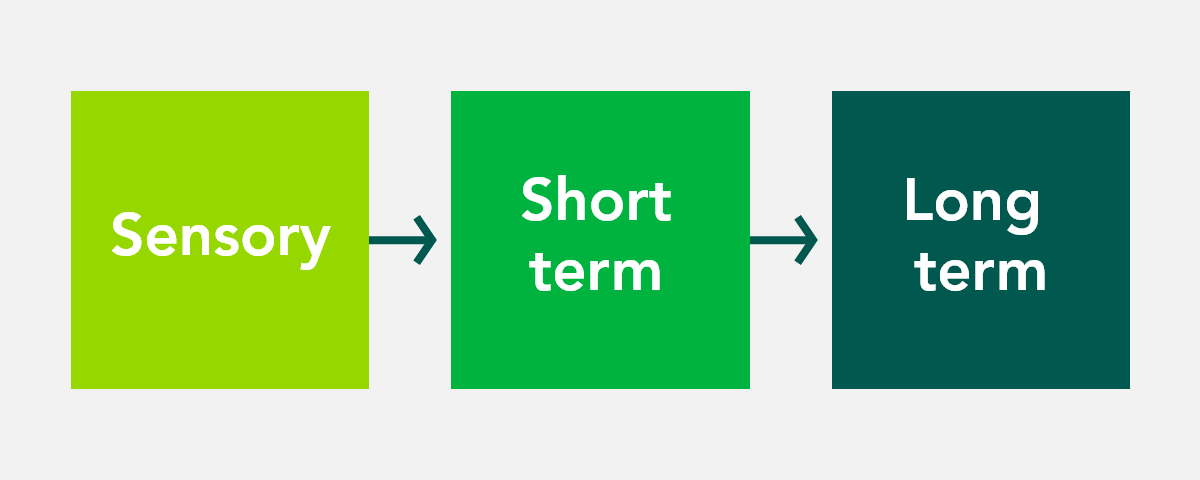The Inner Workings Of The Mind
Cognitivism, born out of Jean Piaget's insights in the 1930s, marked a significant shift from behaviourism. Unlike its predecessor, which focused mostly on what people do (how they behave), cognitivism delves into the inner workings of the mind, exploring how people perceive, remember, and process information.
You'd be right to think this is an important theory to consider when designing learning, so we're going to take a closer look at cognitivism and how we apply the theory to our learning design.
Meaningful And Relevant
Cognitivism prioritises meaningful and relevant learning experiences. It emphasises the importance of connecting new knowledge to existing mental frameworks and steering away from rote memorisation (where you're focused on memorisation through repetition rather than gaining a deeper understanding).
Problem-Solving And Engagement
In the realm of cognitivism, learning goes beyond passive absorption. You're not just absorbing information; you're solving problems and flexing those critical thinking muscles. As well as considering what learners are doing, it considers what they are thinking.
Cognitivism calls for active engagement with the material. Learners are encouraged to participate actively in the learning process, fostering a dynamic interaction between their cognitive processes and the course content.
Memory Lane: Sensory, Short-Term, Long-Term
Cognitivism focuses on the mental processes that affect behaviour and the three stages of memory—sensory, short-term and long-term—to understand the mental processes influencing behaviour.
The goal is to facilitate the transition of information from short-term to long-term memory. And that's worth knowing, because that's what we want from our training programmes, right? We're not looking for employees to "swat up" for a test, we want long-lasting behaviour change—and that means long-term memory.

In alignment with Ebbinghaus' famous forgetting curve, we also advocate a sustained campaign-based approach to learning over cramming. Spacing out and repeating lessons is an effective strategy for enhancing long-term memory retention.
Cognitivism tells us how important it is not to overwhelm the learner with unnecessary information. So there is actually some science behind the need for more personalised learning programmes! For example, offering learners the chance to avoid completing a two-hour course by passing a diagnostic at the start, which removes topics they already understand.
We can also space learning out by using microlearning philosophies and campaign methodologies and therefore decrease the cognitive load that way, delivering up bite-sized pieces at a time.
In practical terms, let's take a look at how cognitivism is applied.
Example: Empowering Employees To Act Against Financial Exploitation
A nonprofit seeks to empower employees to identify and address potential financial exploitation of older adults. These employees often believe they lack the authority to act, especially if they're not certain an account holder (the customer) is being exploited.
The Solution: A Game Anchored In Real-World Scenarios
At the start of the game, learners select an account holder to protect, each with their own set of challenges, based on real-world case studies.
As they advance through the game, they encounter interactive elements where their choices matter, influencing the financial outcome for their hypothetical client. They answer knowledge-check questions to check their understanding at spaced intervals throughout the course.
As the learner spots and stops exploitation, they protect the account holder's money. And if they fail to act, they'll lose their money!
The gamified solution acts like a simulation where the learner receives feedback on their choices, including real-life testimonials from victims and behavioural modelling videos from expert employees, so they can see what good looks like.
The Science Behind The Game
Acknowledging diverse learning styles, cognitivism encourages you to integrate various presentation methods and mediums. Onscreen text, games, animation with voiceover, and interactive video cater to different preferences. Real-world scenarios connect the material to learners' lives, and simulations challenge learners to apply their critical thinking skills. As a result, this encourages active processing.
To reinforce information and aid memory retention, knowledge-check questions prompt learners to retrieve and reinforce information, aligning with cognitivism's focus on memory retention.
Implications For Learning Design
In essence, cognitivism helps us to prioritise meaningful engagement, critical thinking, and the effective transition of knowledge from short-term to long-term memory. Far from irrelevant, after nearly a century, it stands as a cornerstone for creating impactful and enduring learning experiences.
Read More:
- Piaget's Theory And Stages Of Cognitive Development
- Forgetting Curve
- Behave yourself: How behaviourism can lead your learners to success









